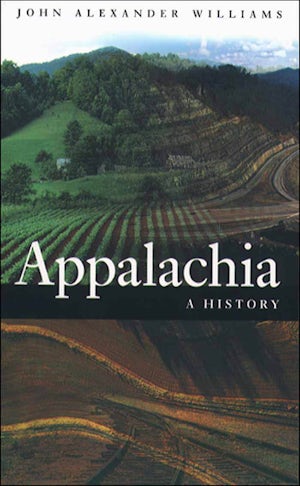Appalachia
A History
By John Alexander Williams
496 pp., 5.75 x 9.25, 30 illus., 8 tables, 5 maps, notes, bibl., index
-
Paperback ISBN: 978-0-8078-5368-9
Published: April 2002 -
E-book EPUB ISBN: 978-0-8078-6052-6
Published: April 2003 -
E-book PDF ISBN: 979-8-8908-7519-8
Published: April 2003
Buy this Book
- Paperback $37.50
- E-Book $27.99
For Professors:
Free E-Exam Copies
Awards & distinctions
2002 Weatherford Prize, Appalachian Center, Berea College
Williams begins his story in the colonial era and describes the half-century of bloody warfare as migrants from Europe and their American-born offspring fought and eventually displaced Appalachia's Native American inhabitants. He depicts the evolution of a backwoods farm-and-forest society, its divided and unhappy fate during the Civil War, and the emergence of a new industrial order as railroads, towns, and extractive industries penetrated deeper and deeper into the mountains. Finally, he considers Appalachia's fate in the twentieth century, when it became the first American region to suffer widespread deindustrialization, and examines the partial renewal created by federal intervention and a small but significant wave of in-migration.
Throughout the book, a wide range of Appalachian voices enlivens the analysis and reminds us of the importance of storytelling in the ways the people of Appalachia define themselves and their region.
About the Author
Author or coauthor of five previous books, John Alexander Williams is professor of history at Appalachian State University in Boone, North Carolina.
For more information about John Alexander Williams, visit
the
Author
Page.
Reviews
"This comprehensive study of the Appalachian past is based on the latest scholarship and original sources. This volume is much more than a textbook; it is an outstanding interpretation of Appalachian history. Williams's explanations on many topics are the best presently available from any publication."—Gordon B. McKinney, Berea College
"By analyzing carefully the complex dialectic of myths surrounding Appalachia, Williams does an especially fine job in evoking a sense of place. This quality is critical to understanding how the people of Appalachia define themselves, and no study can successfully describe the region's history without unraveling these myriad, often contradictory, layers of self-perception. Williams does so with both style and a trenchant sense of irony."—Durwood Dunn, Tennessee Wesleyan College




